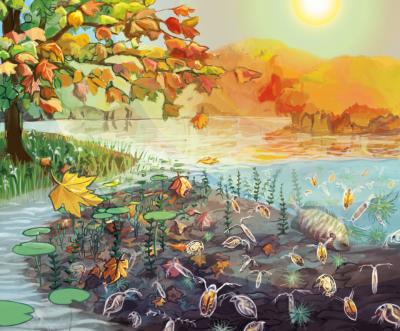Climate-warmed leaves change lake ecosystems, Dartmouth-led study finds

A Dartmouth College-led study finds plankton food webs consisting of zooplankton, algae and bacteria in lakes and ponds are impacted by autumn leaves and rising soil temperatures caused by climate change. Credit: Famartin
The study is one of the first to rigorously explore climate warming's impact on “ecological subsidies,” or the exchange of nutrients and organisms between ecosystems.
“Our findings could have profound consequences for conceptualizing how climate warming impacts linkages between terrestrial and aquatic ecosystems,” says the study's lead author Samuel Fey, a visiting scholar at Dartmouth and a postdoctoral fellow at Yale University.
The findings appear today online in the journal Oikos. A PDF is available on request.
The researchers collected maple leaves during autumn from experimental forest plots where the soil had been warmed or left untouched. They added the leaves to experimental freshwater enclosures containing plankton food webs consisting of zooplankton, algae and bacteria, thus creating “no leaf,” “ambient leaf” and “heated leaf” conditions.
They then monitored the physical, chemical and biological responses in these artificial ponds until the enclosures froze six weeks later.
The results showed that soil warming caused a two-fold decrease in the leaves' phosphorus concentrations, and that the addition of these “warmed” leaves to the ponds decreased the water's phosphorus, dissolved organic carbon and density of bacteria, but improved the water's clarity and caused a three-fold increase in the density of cladoceran zooplankton, commonly called water fleas. Zooplankton provide a crucial source of food to many larger aquatic organisms such as fish.
“Virtually nothing is known about how climate change may alter ecological subsidies,” Fey says. “Our results suggest that changes in soil temperature can have unexpected consequences for lake ecology and that predicting the consequences of climate change will require research across ecosystem boundaries.”
Samuel Fey is available at samuel.fey@yale.edu
Broadcast studios: Dartmouth has TV and radio studios available for interviews. For more information, visit: http://www.
Media Contact
All latest news from the category: Ecology, The Environment and Conservation
This complex theme deals primarily with interactions between organisms and the environmental factors that impact them, but to a greater extent between individual inanimate environmental factors.
innovations-report offers informative reports and articles on topics such as climate protection, landscape conservation, ecological systems, wildlife and nature parks and ecosystem efficiency and balance.
Newest articles

A ‘language’ for ML models to predict nanopore properties
A large number of 2D materials like graphene can have nanopores – small holes formed by missing atoms through which foreign substances can pass. The properties of these nanopores dictate many…

Clinically validated, wearable ultrasound patch
… for continuous blood pressure monitoring. A team of researchers at the University of California San Diego has developed a new and improved wearable ultrasound patch for continuous and noninvasive…

A new puzzle piece for string theory research
Dr. Ksenia Fedosova from the Cluster of Excellence Mathematics Münster, along with an international research team, has proven a conjecture in string theory that physicists had proposed regarding certain equations….



